Victoria Co-operative Fisheries Ltd.: Building Back Bigger, Better, Stronger
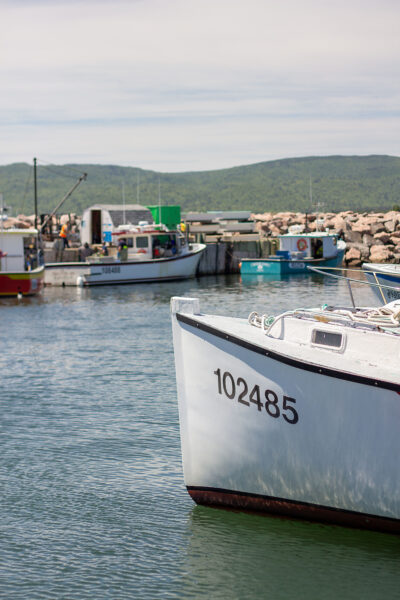
Photo Credit: Shannon MacIntyre (@EatWithShannon)
Located in Neils Harbour lives Victoria Co-operative Fisheries Ltd. (VCFL), a forward-thinking fisheries co-operative. Since its inception in 1955, it’s been a tremendous part of the seafood industry in Nova Scotia, growing to represent over 120 members across seven fishing harbours. Over time, the Co-operative has weathered many challenges, but none quite like September 24, 2022, when Hurricane Fiona hit the province causing extreme damage to Cape Breton Island, including VCFL.
At the time of the storm, the Co-operative had just undergone extensive renovations, recalls Osborne Burke, General Manager of Victoria Co-operative Fisheries Ltd. These renovations included the installation of new processing equipment, as well as many renovations to one of their buildings. In the days leading up to the hurricane, the team had just wrapped up production on Jonah Crab. Come September 22, they were getting ready to head home and working hard to prepare the facility for a lockdown.
By the 23rd, everyone had gone home and the facility was as secure as it could be. As part of their usual storm preparation, barricades were put on the doors; any equipment that was outside was removed. Any portable buildings, like fuel tanks on the wharf for the operating season, were removed. Anything that could be moved above the high-water mark was done. The buildings were closed, the garage door with solid wood planks was bolted and anchored down, and everything was closed and secure. The team at VCFL was confident they were prepared. “[These procedures] had been there for many years since the building was originally constructed in 1958,” explains Burke. “However, the events that occurred on September 24, 2022, were extraordinary. The storm of a century or 50 years; the worst ever seen in Atlantic Canada.”
Unfortunately, when Hurricane Fiona struck, the impact was far greater than anyone ever anticipated; it struck at high tide, bringing record storm surge. “[There was] a storm surge, major winds – winds like I’ve never seen before,” says Burke. “People who’ve lived in the community 50, 60 years had never witnessed the like of what struck on the morning of September 24.”
–
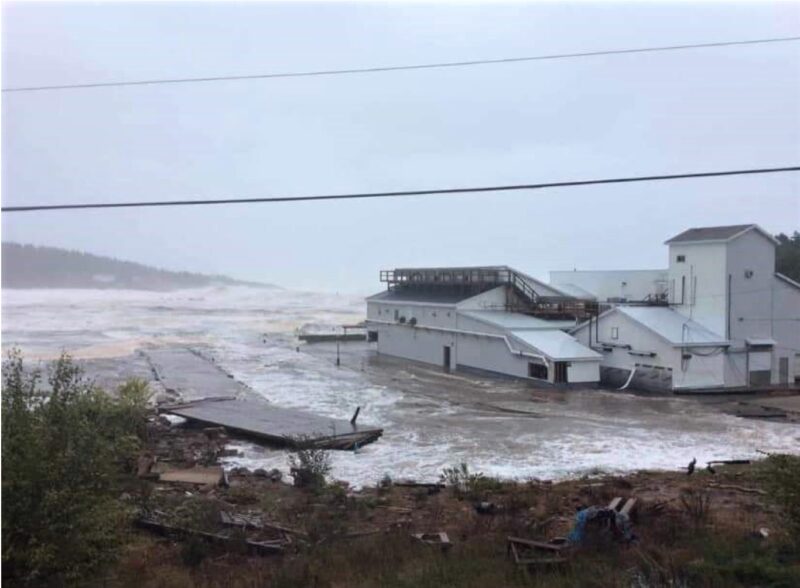
The aftermath of the storm was unbelievable and shocking, and VCFL sustained substantial damage. “[The damage] totally exceeded anything we had anticipated,” says Burke. The corner of the processing facility was completely destroyed. Concrete and partial walls had snapped off. A bridge deck from the Nova Scotia Department of Transportation had come off the roadway, crossed the harbour, struck the building and had taken out the corner causing serious structural damage, and coming to rest on the marginal wharf adjacent to the facility. The doors to the facility failed due to the force of the storm, and the building was completely flooded with up to three or four feet of water.
As if that wasn’t enough, the flood waters that rushed inside the facility were filled with various debris from the ocean, from tree sticks and seaweed to dead seabirds – everything just washed through. Rooms that were spotlessly cleaned prior to the storm were covered in sticks and mud. Equipment, including the new processing equipment, was completely destroyed.
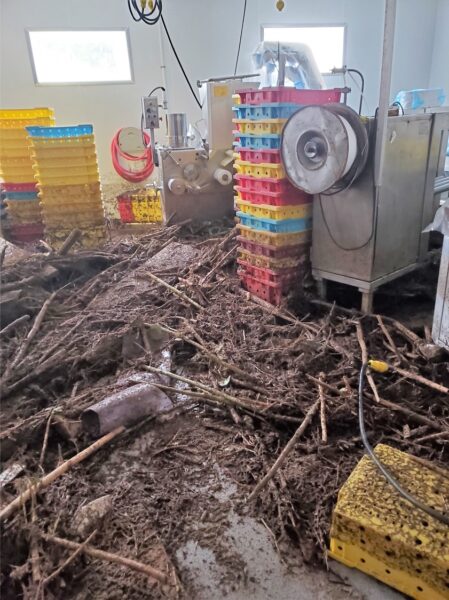
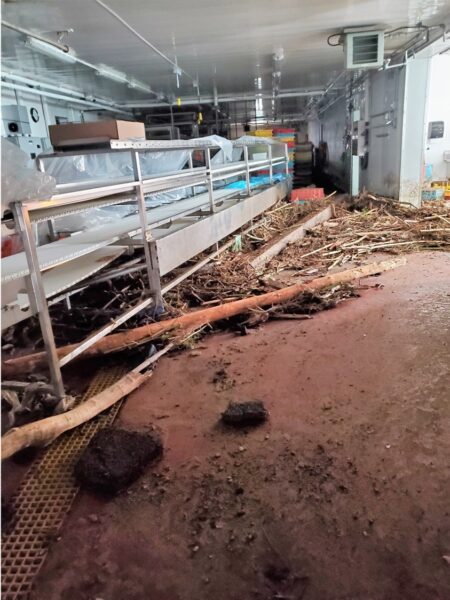
“The level of destruction was unbelievable,” describes Burke. “Nobody ever imagined the damage we would see.” It was to the point where some people looked at it and questioned how they would ever recover from it.
With millions of dollars in damages done to the facility and the loss of products in the range of $1 million, the road to recovery for VCFL would be a long one. That journey started the day after the hurricane, with Burke and the VCFL team immediately reaching out to partners and contractors to start the work on building back.
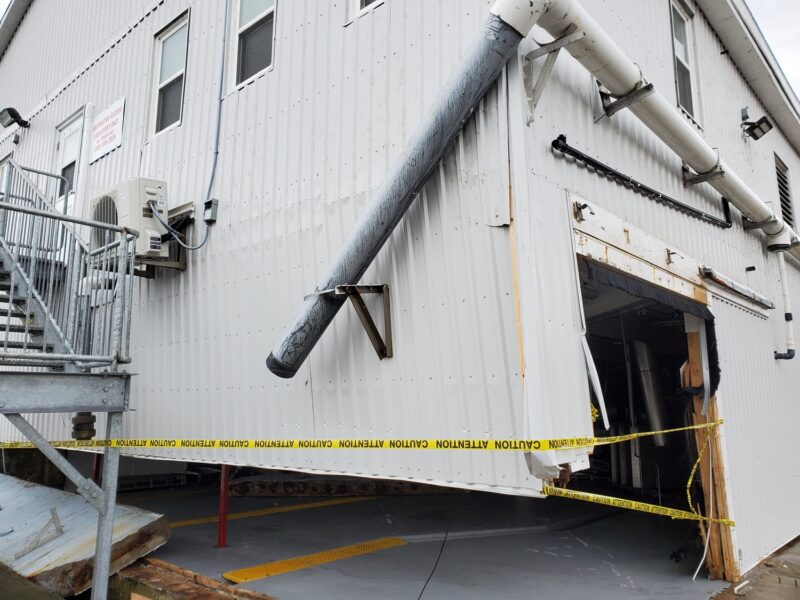
Their first steps were to get a local contractor in place to brace up the lower level of the processing facility before the whole upper level could come tumbling down under the weight of compressor units and fans on the roof. “It was nip and tuck for a few days,” explains Burke. “And wondering what we were going to do – were we going to be able to salvage it?”
Knowing that other regions of Atlantic Canada were impacted by the storm and that resources could be hard to come by, VCFL had to move quickly to secure assistance. Since the facility was only six months out from re-opening next season, the co-operative immediately started conversations for assistance, ranging from their insurance company to 26 different suppliers. With the help of these partners, the Co-operative’s recovery started immediately.
“Everything from electrical motors to pumps, to processing equipment for lobster […] to conveyor belts; we were getting everything we could evaluated,” says Burke. They prepared an inventory of damage for their insurance company and placed the orders for new equipment. “At times, we wondered if we were going to be successful or not, but we never lost focus on the fact that we were going to be ready [to re-open in six months].” That focus paid off, as the Co-operative was able to successfully open for production again on April 17, 2023 – on schedule. The recovery was not 100% complete, but they were able to start production again as their fishing season opened.
“This couldn’t have been done without the team of people that we surrounded ourselves with, and without the help of our contractors, the insurance company, our bank, our outside suppliers, and other partners,” says Burke. “There’s just so many people to thank for their efforts and support of us. Never once did any of our suppliers that we have long-term relationships with ask about how we were going to pay them; they just went and got the job done, which played a big part in our success. We really value those relationships.”
Because VCFL was able to re-open in time, many fishers across Northern Cape Breton were able to count on the Co-operative to purchase their seafood and sell it, ensuring continued access to local seafood. As a huge part of the local seafood industry, had the Co-operative not been able to re-open, the effects on the local food chain – and their partners who support it – would have been devastating.
–

Photo Credit: Alyssa Valletta (@FlavourPhoto)
Garth Brown, an instructor at the Nova Scotia Community College (NSCC) and long-time hospitality professional, is a proud supporter of VCFL. Garth first met the Co-operative team at the Beyond Terroir event at Benjamin Bridge, which blossomed into a longer-term partnership. While initially aware of the damage Cape Breton had suffered at the hands of Fiona, it was in conversation with VCFL that Brown learned of how extensive the damage was.
“We were talking with them about an upcoming event, then we were talking with them about the impact [of the storm] – it just came up in conversation,” said Brown. “As we realized the extent of the damage, we told them we would love to help tell that story, or at least find a way to help them tell that story.” Brown decided to bring the story of damage sustained by VCFL into his classroom.
After the story and pictures of the devastation at VCFL were shared with the NSCC class, “It took the students back a little bit because they hadn’t previously understood it – like, holy smokes, this impacts SO many people,” remarks Brown. “VCFL almost lost everything… so when we see the effects of this storm, it gets emotional. It felt like we had a responsibility to make sure everyone knows what’s happening, that this is happening in our own backyard. We need to support what’s happening there.”
As Brown’s students tried the products and learned their story, they went on to become ambassadors and champions for VCFL. At the college’s annual event, Touch of Class, VCFL’s snow crab was featured prominently as a menu item, and the students were eager to share the story of the Co-operative and their resilience with attendees who sampled that dish. The event was a great opportunity to showcase the story of VCFL and to demonstrate that their products are second to none.
“VCFL is gracious and generous,” explains Brown. “The values of the co-operative and the values of us at the college are very much aligned. We’re proud to support them.”
–
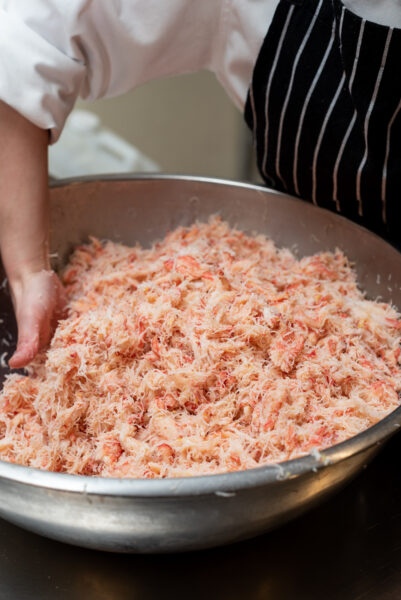
Photo Credit: Alyssa Valletta (@FlavourPhoto)
Another partner that was proud to step up and show support for the Co-operative was chef Kyla Welton, chef and experience manager at Benjamin Bridge. Just like Brown, chef Welton first met the VCFL team at Beyond Terroir. VCFL had reached out to Benjamin Bridge to express how much they appreciated the spirit and execution of the event and wondered if there was a way that they would be able to participate from a seafood angle as a food pairing aspect.
“Having VCFL on board means so much to us,” says chef Welton. “Not only do we get to highlight amazing seafood from Cape Breton, but knowing that this event resonated with their community values too, kind of going from one end of Nova Scotia to the other.”
The opportunity to showcase seafood from across the province could have been dealt a devastating blow. As Burke explained, the hurricane affected the supply chain – it cut off roadways and connections to local food – which, in turn, impacted rural communities. With highways and bridges washed out and so much of the surrounding forest destroyed, the ability to move around and transport goods was limited. For businesses such as Benjamin Bridge and NSCC, who work with and rely on local suppliers, this situation trickles down to the entire local food industry as well.
Chef Welton especially relates to the situation VCFL had encountered with Fiona, as Benjamin Bridge has also experienced damages from the impacts of severe weather – including a devastating frost in spring of 2018. When asked about how much the climate affects local producers, she explained how difficult it is for them to prepare for situations like these.
“It’s difficult for farmers and fishers to prepare for these weather events,” explains Welton. “And then having to rebuild each time; year over year consistency is already a tricky balance to achieve. Our industries have had to adapt quickly.”
Despite the struggles posed to local producers in recent years by a variety of factors, it’s become more important than ever to show support for our local food community.
“Supporting local is something we should all be doing,” says Brown. “It’s a mindset. The more we do, the more economical it becomes. The more we support our community, the more of a community we become. It’s an opportunity to showcase the bounty of what Nova Scotia has.”
“We have the ability to grow and produce so much here,” agrees chef Welton. “We can eat local, and seasonally; we can support local farmers, fishers and producers and see how sustainable we can be on our own.”
“There’s a growing amount of community members who are like-minded and thinking the same way, with the same ethos that we have. Amidst negative events like this, there is a positive light – a desire to continue moving in the direction of supporting local.”
–
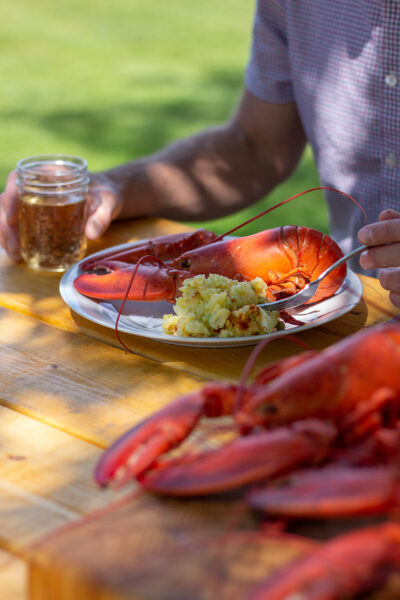
Photo Credit: Shannon MacIntyre (@EatWithShannon)
Though they are still dealing with some elements of recovery, VCFL’s ability to re-open for their 2023 season gives them hope for the future. Their focus going forward is to continue on delivering quality products and looking ahead to future years with increased sales and more year-round production and employment.
“We’re bigger. We’re better. We’re stronger,” says Burke. “And we’re going to have an even better facility as we continue on.”
–
